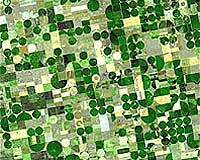 |
Beijing (AFP) June 17, 2009 Climate change hits China's poor the hardest and also forces some of those lifted out of hardship back into it, activist groups Greenpeace and Oxfam said Wednesday. The two urged the Chinese government to review its existing poverty alleviation policy to take climate change into account, in a report compiled with experts from the nation's Academy of Agricultural Sciences. "Climate change is making poverty alleviation work harder... because as soon as there is a disaster in those places where the environment is very fragile, these return to poverty," Xu Yinlong of the academy told reporters. According to Hu Angang, an economist at Beijing's Tsinghua University who wrote a preface to the report, China is one of the countries in the world most prone to natural disasters. "More than 70 per cent of Chinese cities and over 50 percent of the population are located in areas susceptible to serious meteorological, seismic or oceanic disasters," he wrote. And 95 per cent of those living in absolute poverty in China are living in ecologically fragile areas in the interior of the country, the report added, highlighting the correlation between hardship and a weak environment. These places are now showing signs of climate change, including glacial retreat, an increase in droughts, enhanced soil erosion and frequent extreme weather events. The report took three areas in China as case studies, including Yangshan county in the generally wealthy southern province of Guangdong. In Yangshan, rain is falling with increased intensity but in fewer bursts, reducing the availability of water as a resource and leading to floods. "Yangshan's agricultural production, livelihood and living conditions could further deteriorate," the report said. Greenpeace and Oxfam urged China to take the lead in adopting a climate rescue treaty at a key meeting on climate change in December, and introduce measures such as elevating bridges and roads in flood-prone areas. Share This Article With Planet Earth
Related Links Farming Today - Suppliers and Technology
 Is This The Beginning Of The End Of Plant Breeding
Is This The Beginning Of The End Of Plant BreedingWashington DC (SPX) Jun 16, 2009 No human is a clone of their parents but the same cannot be said for other living things. While your DNA is a combination of half your mother and half your father, other species do things differently. The advantage of clonal reproduction is that it produces an individual exactly like an existing one-which would be very useful for farmers who could replicate the best of their animals or crops ... read more |
|
| The content herein, unless otherwise known to be public domain, are Copyright 1995-2009 - SpaceDaily. AFP and UPI Wire Stories are copyright Agence France-Presse and United Press International. ESA Portal Reports are copyright European Space Agency. All NASA sourced material is public domain. Additional copyrights may apply in whole or part to other bona fide parties. Advertising does not imply endorsement,agreement or approval of any opinions, statements or information provided by SpaceDaily on any Web page published or hosted by SpaceDaily. Privacy Statement |